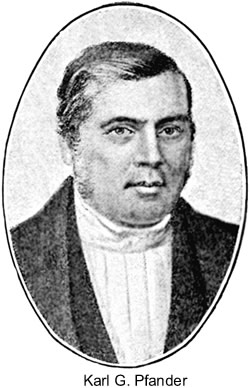Carl [Karl] Gottlieb Pfander
 Reference: Pfander, Carl [Karl] Gottlieb(1805-1865), Tariqu'l-Hyat: The
Path of Life, Translated and thoroughly revised by W. St. Clair Tisdall,
Christian Literature Society for India, London, England, 1912, pp. 335. Reference: Pfander, Carl [Karl] Gottlieb(1805-1865), Tariqu'l-Hyat: The
Path of Life, Translated and thoroughly revised by W. St. Clair Tisdall,
Christian Literature Society for India, London, England, 1912, pp. 335.
In his book entitled, The Muhammadan Controversy, Sir William
Muir wrote the following on the works of Dr. Pfander.
We pass on to the consideration of Dr. Pfander's writings, which
consist of three treatises: first, Mizan-ul-Haqq, or
"Balance of Truth"; second, Miftah-ul-Asrar, or
"Key of Mysteries"; and third, Tariq-ul-Hyat, or "
Way of Salvation." They were originally written in Persian, but
have also been published in Urdoo, excepting the last which is in
progress of translation. From his residence and travels in Persia,
Pfander possesses advantages which fortunately qualify him in an unusual
degree for the great controversy with our Moslem population. He was
attached for ten or twelve years to the German mission at Fort Shushy on
the confines of Georgia, from whence he made frequent and protracted
visits to Persia, penetrating as far as Bagdad, and returning by a
circuitous tour through Isfahan and Teheran. In 1836, the Russian
Government, unable to tolerate the presence of foreign ecclesiastics,
put a stop to the mission, and thus proved the means of providing us
with labourers who in the field of Persia had acquired so valuable a
knowledge of its language and so intimate an acquaintance with the
religion and tenets of the Mohammedans. Pfander joined the Indian
mission of the C. M. S. in 1838.
Our author has not been backward in improving his
peculiar privileges, or in availing himself of the help which the
previous controversy and such writings as those of Dr. Lee afforded him.
His first and most important work is the Mizan-ul-Haqq, or
"Balance of Truth," as between Christians and Moslems; and
being of extraordinary value, we shall endeavour to present our readers
with a complete account of it. The original Persian edition was
published at Shushy in 1835, and the Urdoo translation was lithographed
at Mirzapore in 1843 ....1
Arabic, Greek, and Sanskrit: There are
quotations in Arabic, Greek, and Sanskrit text that use
Unicode. The Sanskrit text uses a Microsoft font (mangal.ttf). It may be
necessary to configure your web browser to visualize this text. The
Muhammadanism web site has help files for Unicode. You can make sure that
your web browser displays properly the Unicode Arabic characters by logging onto
the Internet and clicking, Unicode.
Last edited 02-26-2001
|
